初中英语牛津译林版九上 Unit6 TV programmes Grammar 课件(1课时)
文档属性
| 名称 | 初中英语牛津译林版九上 Unit6 TV programmes Grammar 课件(1课时) |
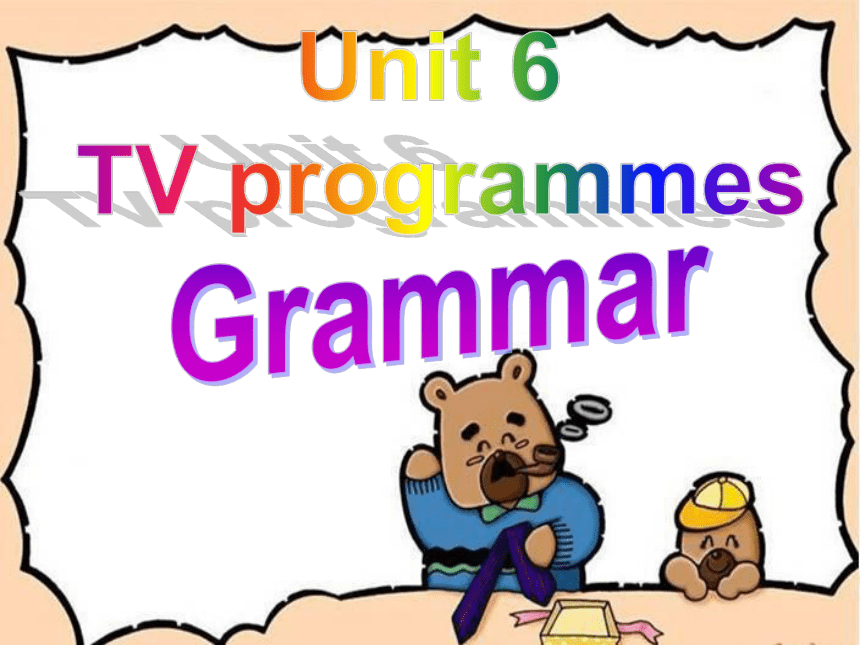
|
|
| 格式 | zip | ||
| 文件大小 | 632.1KB | ||
| 资源类型 | 教案 | ||
| 版本资源 | 牛津译林版 | ||
| 科目 | 英语 | ||
| 更新时间 | 2015-11-12 00:00:00 | ||
图片预览

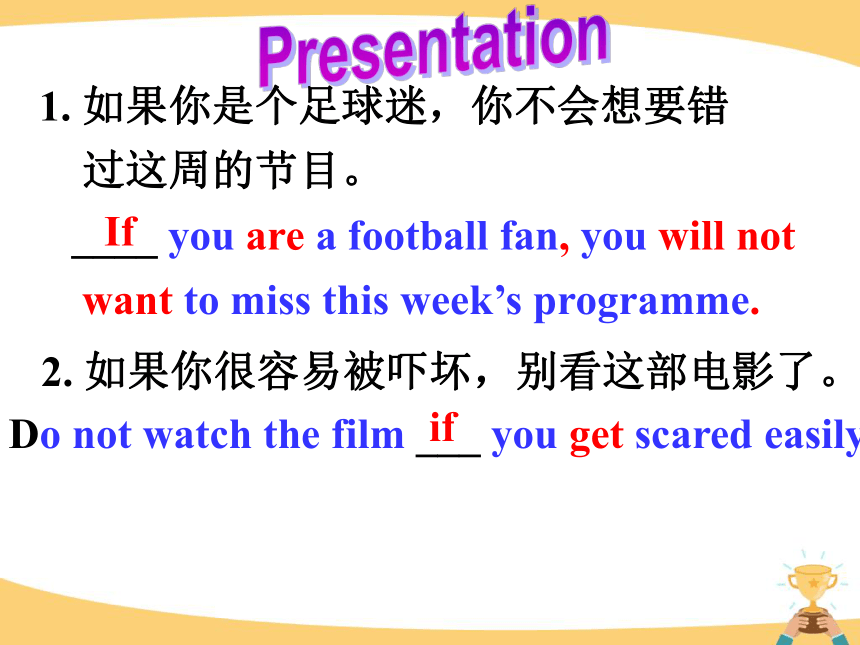
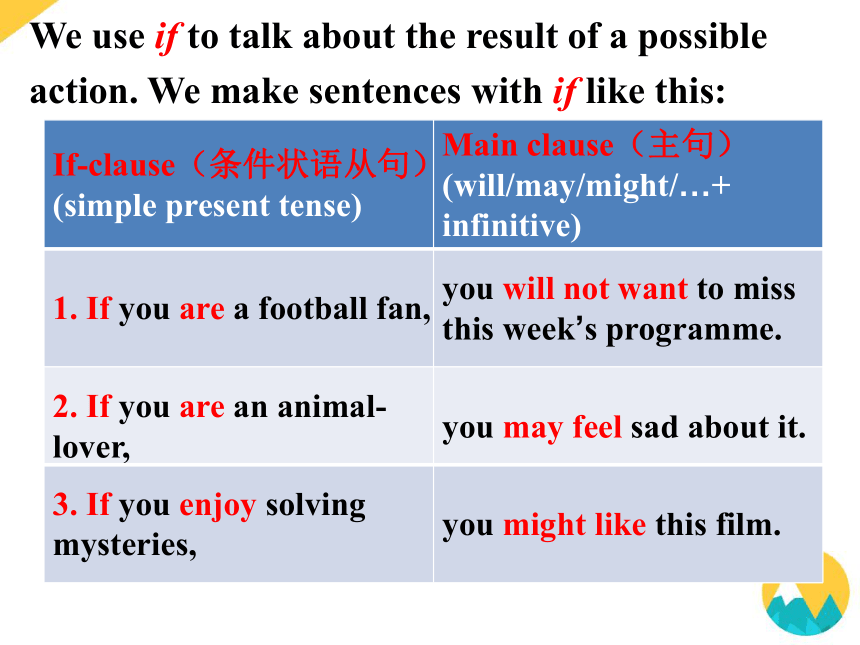
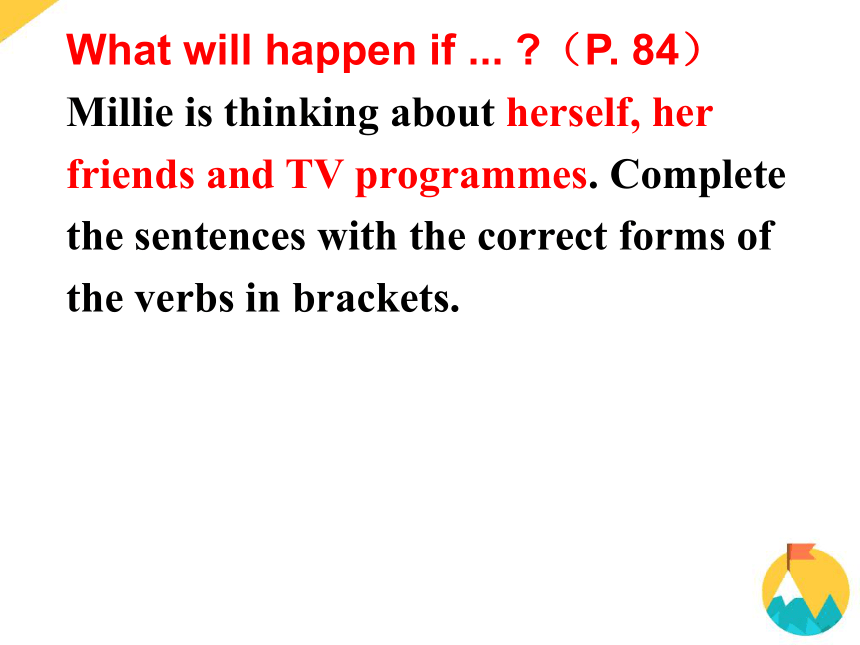
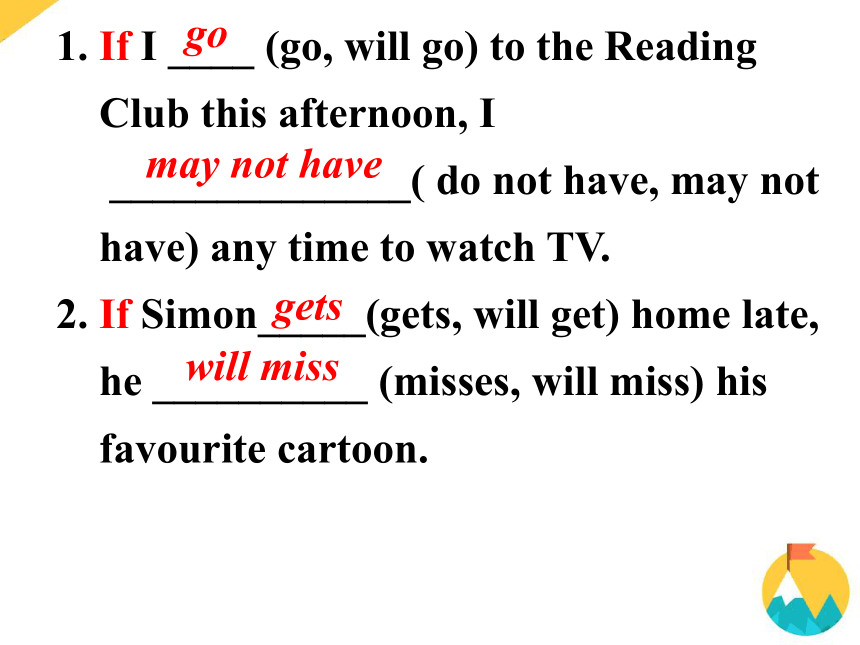
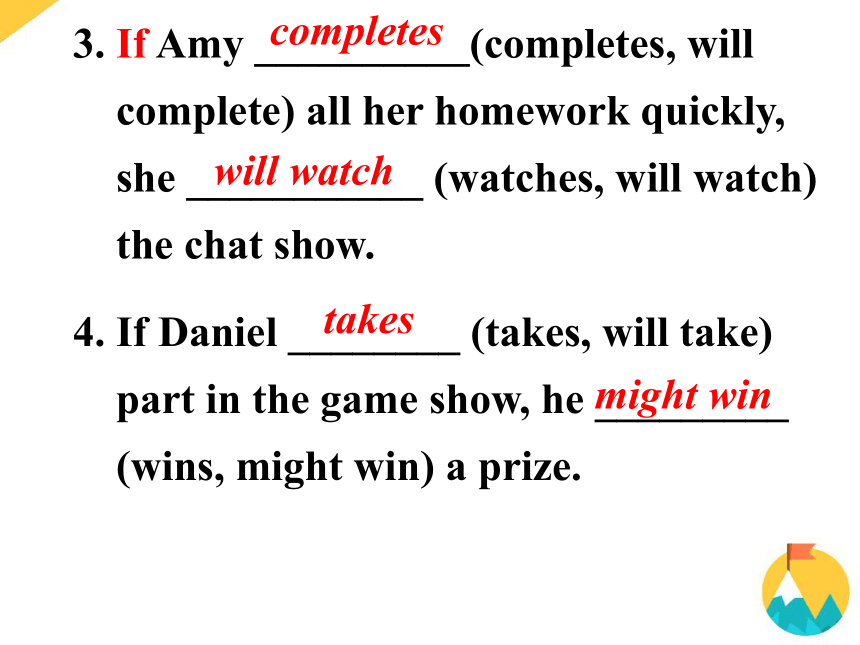
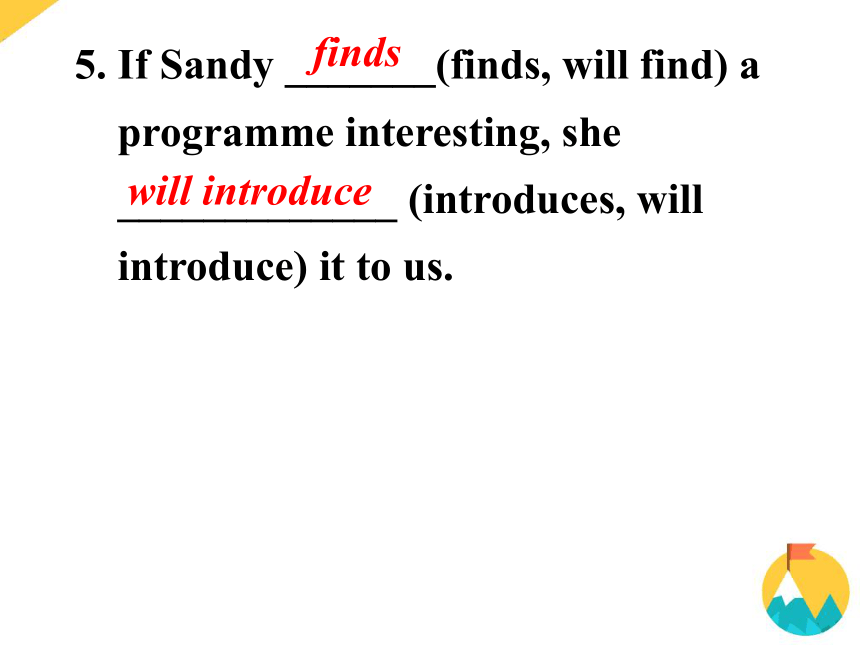
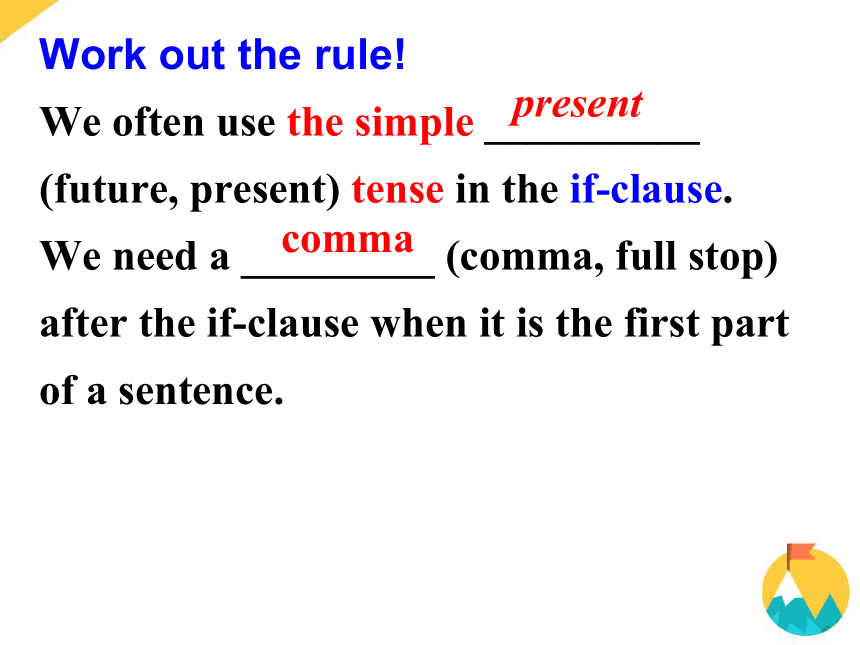
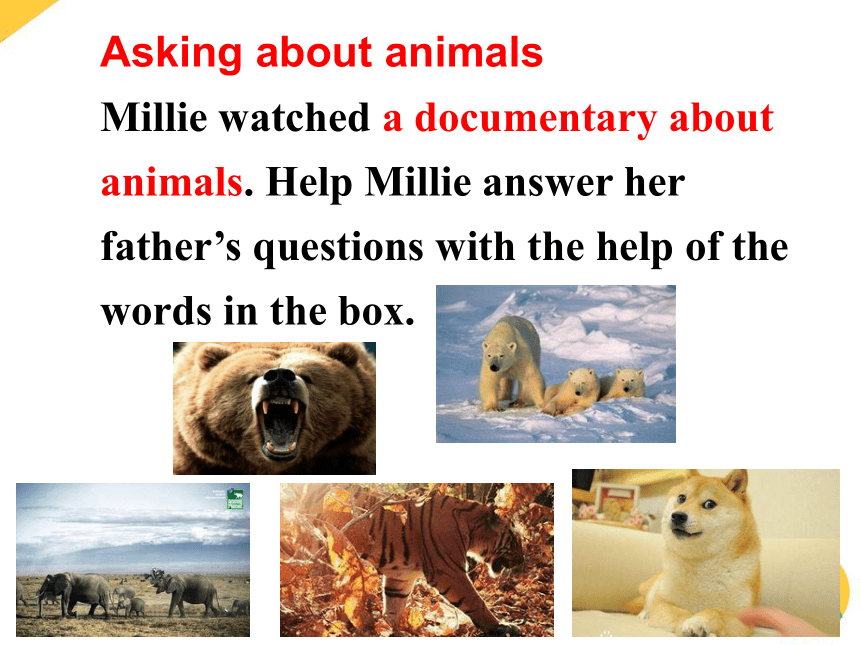
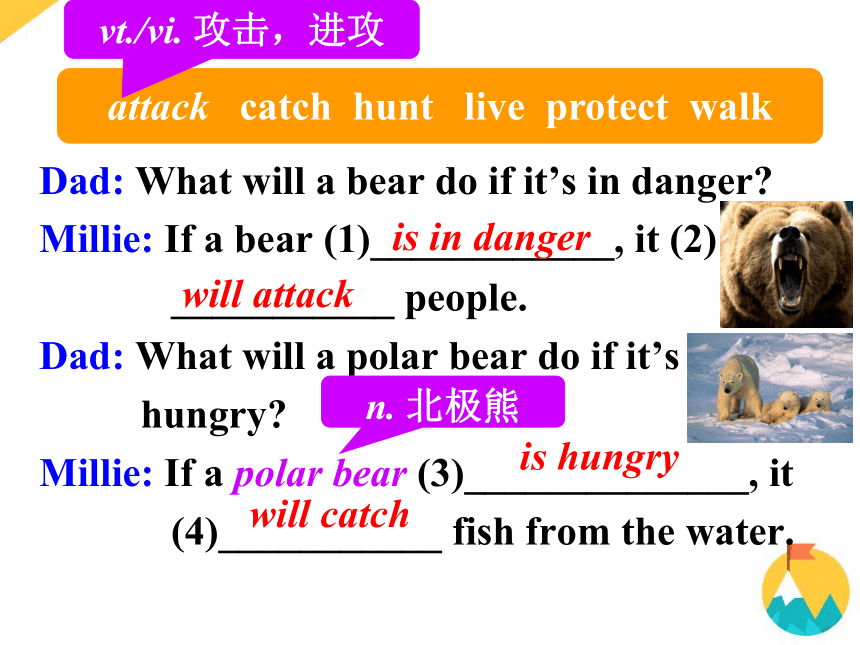
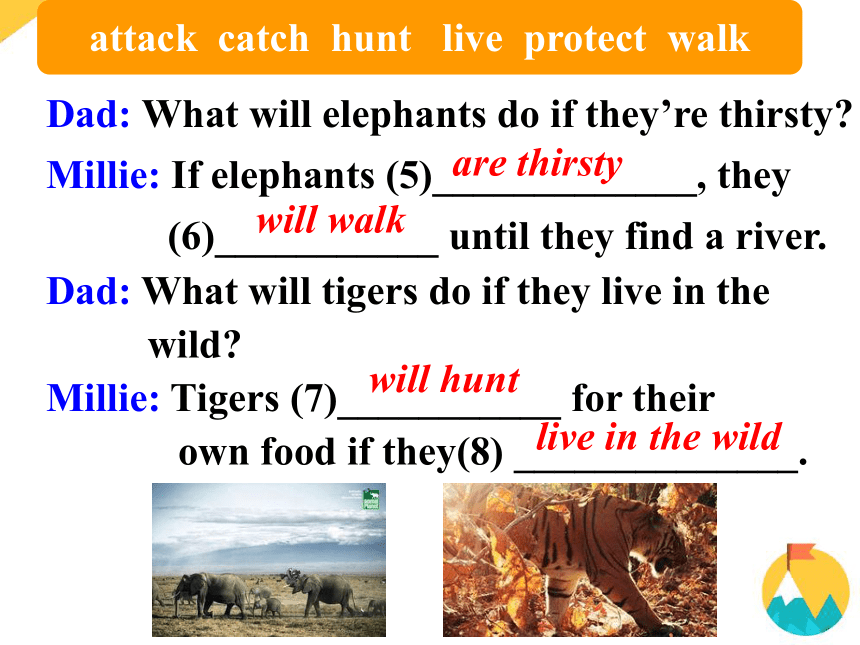
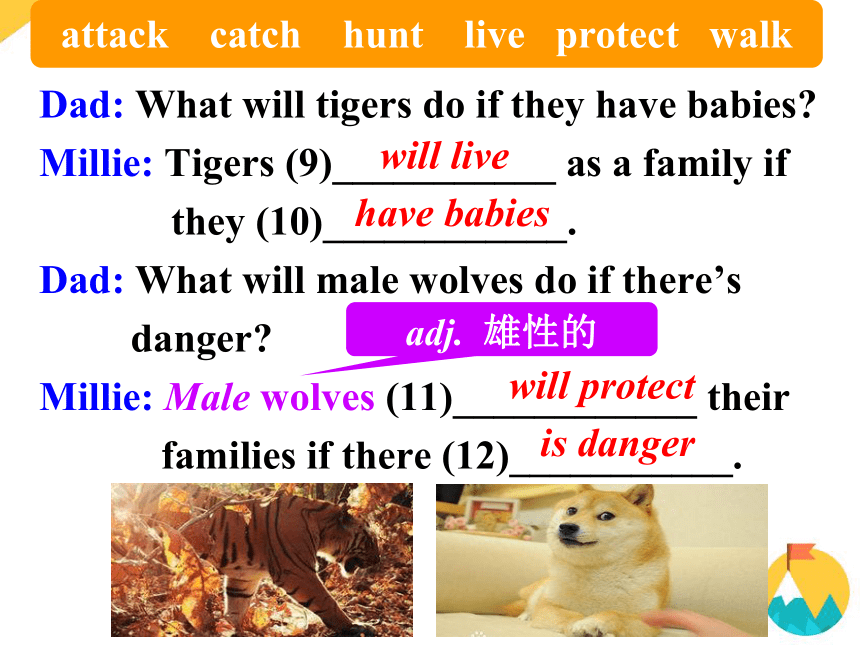
文档简介
课件31张PPT。Unit 6
TV programmesGrammarPresentation1. 如果你是个足球迷,你不会想要错
过这周的节目。
____ you are a football fan, you will not
want to miss this week’s programme.
2. 如果你很容易被吓坏,别看这部电影了。
Do not watch the film ___ you get scared easily. If if We use if to talk about the result of a possible action. We make sentences with if like this:What will happen if ... ?(P. 84)
Millie is thinking about herself, her friends and TV programmes. Complete the sentences with the correct forms of the verbs in brackets. If I ____ (go, will go) to the Reading
Club this afternoon, I
______________( do not have, may not
have) any time to watch TV.
2. If Simon_____(gets, will get) home late,
he __________ (misses, will miss) his
favourite cartoon.gomay not havegetswill miss3. If Amy __________(completes, will
complete) all her homework quickly,
she ___________ (watches, will watch)
the chat show.completeswill watch4. If Daniel ________ (takes, will take)
part in the game show, he _________
(wins, might win) a prize.takesmight win5. If Sandy _______(finds, will find) a
programme interesting, she
_____________ (introduces, will
introduce) it to us.findswill introduceWork out the rule!
We often use the simple __________
(future, present) tense in the if-clause.
We need a _________ (comma, full stop)
after the if-clause when it is the first part
of a sentence. presentcommaAsking about animals
Millie watched a documentary about animals. Help Millie answer her father’s questions with the help of the words in the box.Dad: What will a bear do if it’s in danger?
Millie: If a bear (1)____________, it (2)
___________ people.
Dad: What will a polar bear do if it’s
hungry?
Millie: If a polar bear (3)______________, it
(4)___________ fish from the water.attack catch hunt live protect walkis in dangerwill attackis hungrywill catchvt./vi. 攻击,进攻n. 北极熊Dad: What will elephants do if they’re thirsty?
Millie: If elephants (5)_____________, they
(6)___________ until they find a river.
Dad: What will tigers do if they live in the
wild?
Millie: Tigers (7)___________ for their
own food if they(8) ______________.attack catch hunt live protect walkare thirstywill walkwill huntlive in the wildDad: What will tigers do if they have babies?
Millie: Tigers (9)___________ as a family if
they (10)____________.
Dad: What will male wolves do if there’s
danger?
Millie: Male wolves (11)____________ their
families if there (12)___________.attack catch hunt live protect walkwill livehave babieswill protectis dangeradj. 雄性的Using unless(除非…)
We can use unless to say that something
can only happen or be true in a
particular situation.
e.g. He won’t come to the party if
you don’t invite him.
=He won’t come to the party unless
you invite him.So we can useunless to replace if ... not .
1. The situation will continue if
humans do not stop hunting them
for their fur and bones.
→ The situation will continue unless
humans stop hunting them for
their fur and bones.
2. If it does not rain tomorrow, we are
going to play football in the park.
→ Unless it rains tomorrow, we are
going to play football in the park.
The unless-clause can come first or after the main clause.
e.g. Unless you try your best, you will
not realize your dream.
=You will be late unless you leave
right now.
A trip to a film and TV studio
Sandy has prepared some tips for a school trip to a film and TV studio. However, she tore the tips by accident. Help her put the tips back together. Match the two parts of the sentences and write the correct letters in the blanks..Unless the weather report says it is
going to rain, ______
2. We will arrive at the studio around 9:30 a.m., _______c. you will not have to take an umbrella with you.
d. unless the traffic is very heavy.cd.Unless you already know the studio
very well, ______
4. You will buy your lunch at the restaurants in the studio, ______a. unless you take your own food with you.
f. you will travel around it with a tour
guide.fa5 Unless you are tired, ______
You will have a chance to see how a TV
programme is recorded, ______beb. you will not need to take the minibus in the studio.
e. unless you have little interest in it.Work out the rule!
We use the simple _________ (future, present) tense in the unless-clause.present单项选择。
1. If?there?________?no?buying?and?selling
of?animals,?there?_______?no?killing?in
nature.?
A.?is;?will?be?????B.?will?be;?will?be????
C.?is;?is??????? D.?will?be;?is AExercises2. I’m?waiting?for?my?friend._______,?
I’ll?go?shopping?alone.?
A.?If?she?comes?????
B.?If?she?won’t?come????
C.?If?she?doesn’t?come?C3. We are going to play basketball
_______ it rains.
A. if not B. when
C. except that D. unlessD4. Eat less food _______ you want to put
on weight.
A. if B. unless
C. until D. as soon asB 条件状语从句
条件状语从句主要由if或unless引导:?
if条件句?
?1) if条件句:条件句用于陈述语气,表示
假设的情况可能发生,其中?if?是“如果”
的意思。
e.g. If it rains, we will stay at home.
如果下雨我们就待在家里。Grammar2)?用法:?
(1)条件状语从句通常由连词if引导,意为“如
果、假如”,主句不能用be?going?to表示将
来,而应该用shall, will。
e.g. If?you?leave?now,?you?will?never?regret?it.?
如果你现在离开,你永远都不会后悔。
(2)if?“如果”,引导条件状语从句,主句用一般将来时,从句则用一般现在时。
e.g. If?it?rains?tomorrow,?I?shan’t?climb?the?hills.
如果明天下雨,我就不爬山了。(3)主句是祈使句或含有情态动词,从句也用一
般现在时。
e.g. Please?call?me?if?he?comes?next?Sunday.
如果他下周日过来请打电话给我。
注意:?宾语从句中的if与条件状语从句if的区 别。宾语从句中的if “是否”相当于?whether, 引导宾语从句, 时态需根据语境确定。如果主句用一般现在时, 从句可以根据具体情况选用时态, 如果主句用一般过去时, 从句必须用过去时的某种形式。unless 条件句
unless引导的条件句,表示强烈的否定。翻译为“除非……”“非……不可”。
e.g. You?will?fail?unless?you?work?harder.?
你不努力就会失败的。
=You will fail if you do not work harder.
注意: unless?从句里的谓语只能是肯定
式, 因为本身unless表示否定。Finish the exercises in the
workbook.Homework
TV programmesGrammarPresentation1. 如果你是个足球迷,你不会想要错
过这周的节目。
____ you are a football fan, you will not
want to miss this week’s programme.
2. 如果你很容易被吓坏,别看这部电影了。
Do not watch the film ___ you get scared easily. If if We use if to talk about the result of a possible action. We make sentences with if like this:What will happen if ... ?(P. 84)
Millie is thinking about herself, her friends and TV programmes. Complete the sentences with the correct forms of the verbs in brackets. If I ____ (go, will go) to the Reading
Club this afternoon, I
______________( do not have, may not
have) any time to watch TV.
2. If Simon_____(gets, will get) home late,
he __________ (misses, will miss) his
favourite cartoon.gomay not havegetswill miss3. If Amy __________(completes, will
complete) all her homework quickly,
she ___________ (watches, will watch)
the chat show.completeswill watch4. If Daniel ________ (takes, will take)
part in the game show, he _________
(wins, might win) a prize.takesmight win5. If Sandy _______(finds, will find) a
programme interesting, she
_____________ (introduces, will
introduce) it to us.findswill introduceWork out the rule!
We often use the simple __________
(future, present) tense in the if-clause.
We need a _________ (comma, full stop)
after the if-clause when it is the first part
of a sentence. presentcommaAsking about animals
Millie watched a documentary about animals. Help Millie answer her father’s questions with the help of the words in the box.Dad: What will a bear do if it’s in danger?
Millie: If a bear (1)____________, it (2)
___________ people.
Dad: What will a polar bear do if it’s
hungry?
Millie: If a polar bear (3)______________, it
(4)___________ fish from the water.attack catch hunt live protect walkis in dangerwill attackis hungrywill catchvt./vi. 攻击,进攻n. 北极熊Dad: What will elephants do if they’re thirsty?
Millie: If elephants (5)_____________, they
(6)___________ until they find a river.
Dad: What will tigers do if they live in the
wild?
Millie: Tigers (7)___________ for their
own food if they(8) ______________.attack catch hunt live protect walkare thirstywill walkwill huntlive in the wildDad: What will tigers do if they have babies?
Millie: Tigers (9)___________ as a family if
they (10)____________.
Dad: What will male wolves do if there’s
danger?
Millie: Male wolves (11)____________ their
families if there (12)___________.attack catch hunt live protect walkwill livehave babieswill protectis dangeradj. 雄性的Using unless(除非…)
We can use unless to say that something
can only happen or be true in a
particular situation.
e.g. He won’t come to the party if
you don’t invite him.
=He won’t come to the party unless
you invite him.So we can useunless to replace if ... not .
1. The situation will continue if
humans do not stop hunting them
for their fur and bones.
→ The situation will continue unless
humans stop hunting them for
their fur and bones.
2. If it does not rain tomorrow, we are
going to play football in the park.
→ Unless it rains tomorrow, we are
going to play football in the park.
The unless-clause can come first or after the main clause.
e.g. Unless you try your best, you will
not realize your dream.
=You will be late unless you leave
right now.
A trip to a film and TV studio
Sandy has prepared some tips for a school trip to a film and TV studio. However, she tore the tips by accident. Help her put the tips back together. Match the two parts of the sentences and write the correct letters in the blanks..Unless the weather report says it is
going to rain, ______
2. We will arrive at the studio around 9:30 a.m., _______c. you will not have to take an umbrella with you.
d. unless the traffic is very heavy.cd.Unless you already know the studio
very well, ______
4. You will buy your lunch at the restaurants in the studio, ______a. unless you take your own food with you.
f. you will travel around it with a tour
guide.fa5 Unless you are tired, ______
You will have a chance to see how a TV
programme is recorded, ______beb. you will not need to take the minibus in the studio.
e. unless you have little interest in it.Work out the rule!
We use the simple _________ (future, present) tense in the unless-clause.present单项选择。
1. If?there?________?no?buying?and?selling
of?animals,?there?_______?no?killing?in
nature.?
A.?is;?will?be?????B.?will?be;?will?be????
C.?is;?is??????? D.?will?be;?is AExercises2. I’m?waiting?for?my?friend._______,?
I’ll?go?shopping?alone.?
A.?If?she?comes?????
B.?If?she?won’t?come????
C.?If?she?doesn’t?come?C3. We are going to play basketball
_______ it rains.
A. if not B. when
C. except that D. unlessD4. Eat less food _______ you want to put
on weight.
A. if B. unless
C. until D. as soon asB 条件状语从句
条件状语从句主要由if或unless引导:?
if条件句?
?1) if条件句:条件句用于陈述语气,表示
假设的情况可能发生,其中?if?是“如果”
的意思。
e.g. If it rains, we will stay at home.
如果下雨我们就待在家里。Grammar2)?用法:?
(1)条件状语从句通常由连词if引导,意为“如
果、假如”,主句不能用be?going?to表示将
来,而应该用shall, will。
e.g. If?you?leave?now,?you?will?never?regret?it.?
如果你现在离开,你永远都不会后悔。
(2)if?“如果”,引导条件状语从句,主句用一般将来时,从句则用一般现在时。
e.g. If?it?rains?tomorrow,?I?shan’t?climb?the?hills.
如果明天下雨,我就不爬山了。(3)主句是祈使句或含有情态动词,从句也用一
般现在时。
e.g. Please?call?me?if?he?comes?next?Sunday.
如果他下周日过来请打电话给我。
注意:?宾语从句中的if与条件状语从句if的区 别。宾语从句中的if “是否”相当于?whether, 引导宾语从句, 时态需根据语境确定。如果主句用一般现在时, 从句可以根据具体情况选用时态, 如果主句用一般过去时, 从句必须用过去时的某种形式。unless 条件句
unless引导的条件句,表示强烈的否定。翻译为“除非……”“非……不可”。
e.g. You?will?fail?unless?you?work?harder.?
你不努力就会失败的。
=You will fail if you do not work harder.
注意: unless?从句里的谓语只能是肯定
式, 因为本身unless表示否定。Finish the exercises in the
workbook.Homework
